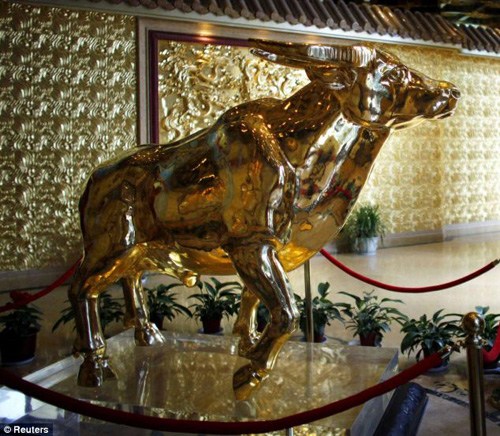According to the Global Times, the 2,000 members of the original households each receive annual dividends from the stocks they were allocated. The so-called poorest of the rich might receive 100,000 yuan, while the wealthiest get a 2-million-yuan pay out each year.
"We used to have a very difficult life. We lived in a thatched shed, ate bran and had nothing in our pockets," recalled Wu. "A lot of people asked me how Huaxi succeeded in becoming rich. I can tell you all our accomplishments were achieved through hard work. We don't worry about paying taxes. I only worry about not paying enough taxes."
Thanks to the remarkable achievements Huaxi has made in recent years, the village and its residents have all become rich. One unique characteristic of Huaxi's success story is that there is no big gap between poor and rich people living in the village. They are truly enjoying a common prosperity, revealed China Radio International (CRI).
Michael Wines once wrote in the New York Times: "For though not many foreigners have heard of Huaxi, Chinese far and wide know it as the socialist collective that works!the village where public ownership of the means of production has not just made everyone equal, but rich, too."
"When China effectively embraced capitalism in the 1980s, Huaxi was an agrarian hovel, reachable by dirt roads. Mr. Wu, then the local Communist Party secretary, seized on the new market freedoms to shift the Huaxi economy from farming to manufacturing and trade, but with a twist: the residents would throw their money into a collective pot and share in the take from whatever new businesses they bought," Wines added.
"In the 30 years after the opening up, the system changed in many places," Wu Xie, Wu's son, told the New York Times. "Some chose private ownership, but we Huaxi people chose public ownership. The biggest benefit is that the people share the common prosperity。"
However, as critics have pointed out, that common prosperity is limited to the 2,000 original households that own most of the village's wealth, and there is a clear gap between them and the residents of adjacent villages, as well as the migrant workers who support local industry.
Over 25,000 migrant workers, half of the village's population, earn monthly salaries by providing labor for the factories on 12-hour shifts without weekend breaks, but they do not share in the village's wealth.
"The monthly salaries of 3,000 yuan are better than average for low-skilled labor in China, but it is hardly a worker's paradise," analyzed Jonathan Watts.
Even the villas and cars of Huaxi's original residents are part of the collective, and villagers do not have property rights. Once a villager leaves, he or she loses everything, reported the Global Times.
Wu has also been criticized as creating a hierarchy largely determined by closeness to his clan.
The village is also facing other challenges. The proportion of income from its pillar iron and steel industry has fallen from two-thirds to less than a third, due to rising material costs and falling demand, the Nanjing-based newspaper Modern Express revealed.
"This is the worst situation I have experienced. It will get worse in the future. People in this industry are panicking," Yang Yongchang, general manager of the Jiangyin Huaxi Iron and Steel Company for eight years, told the Guardian.
Yang added that Huaxi is planning to move the factory so it can reinvent itself as a tourist resort and commodities-trading hub. "We're trying to build an ecological village that looks like a forest garden."
A massive 328-meter skyscraper was inaugurated last October, marking the 50th birthday of the richest village in the country and serving as part of the village's plan to boost its tourist industry.
The five-star hotel cost 3 billion yuan to build. Two-thirds of the funds were raised from 200 families in the village, each giving 10 million yuan. The proudest feature of the hotel is a one-ton solid-gold bull on the 60th floor, valued at 400 million yuan, reported the Global Times.


















